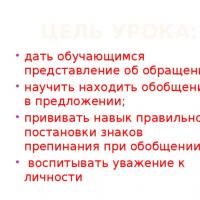Tips on how to survive being fired from your job. How to survive being fired. Be polite and reserved
Font A A
Suddenly leaving the workplace, and even against one's own will, can cause stress for anyone. In fact, you should not treat the situation as a tragedy and the end of life. We have collected the best ways that will tell you how to survive being fired from your job, find peace and harmony with yourself.
For some, leaving work even of their own accord seems like the greatest problem, while others think that they were fired from their job so that they could finally realize their dreams. Avid workaholics should understand that hundreds of vacancies open every day, and they only need one! Days on end in the office, and a lot of instructions from management do not give the opportunity to think about development, so dismissal has its benefits.
Look at the problem from a different angle
Constantly telling yourself that life is over after being fired only brings harm. It is not at all necessary to bring everything to apathy and depression.
It’s hardly worth driving yourself into stress that only a psychologist can get you out of.
Forced idleness can easily be turned to your advantage. There are many ways, the main thing is to choose something you like. You can devote time to your needs or immediately rush to look for a new vacancy.
Time to look for a job
Finding your dream job is quite possible. This will not happen right away, however, with the right approach, you can plan your time so that you can get everything done before starting a new job. Estimate the right time and create a budget for this period. Plan all your activities and don't forget about rest and entertainment.
Vacation heals
When apathy towards everything sets in, tourism or a yoga seminar would be an excellent solution. Contact with nature and spiritual practices will help you find harmony. Running in the morning or others will help physical exercise. All it takes is a little desire and a wardrobe update. Just a couple of weeks in this mode, and you won’t want to return to a stuffy office.
Start an active job search
After a good rest, you can start looking for the much-desired job with special zeal. To do this, you need to create a thoughtful resume describing your capabilities and knowledge. You should check the labor market situation daily. If possible, you should definitely call employers and find out the details. You will have to go to interviews for some time, as if you were going to a job, and choose the best among the best.
30-minute daily walk
After quitting your job, you should take care of your health. Not everyone is a fan of running, but hardly anyone will object to a regular half-hour walk in the fresh air in the morning. It will distract you from heavy thoughts and allow you to contemplate nature. In the morning the air is as clean as possible due to the small number of cars. After a new job appears, there is hardly time for such a ritual.

Don't forget about physical activity
Physical activity is good for both the body and the brain. Constantly sitting on the couch and sleeping for a long time contributes to the deterioration of mood and health. You don’t have to go to expensive fitness clubs and gyms; home workouts are enough. Morning exercises will help you cheer up and fill you with energy.
Make time for healthy eating
If fate has given you a break, then you need to use it to maximum advantage. Office work involves irregular meals and a lot of coffee. It's time to correct the situation and learn to cook healthy meals. Simple recipes with familiar ingredients are not only delicious, but also help save both time and money.
You should think about a part-time job
Dismissal can be unexpected and may happen at the wrong time. There is no such thing as too much money, so alternative income is a good idea. This will increase self-confidence and help you relax when you are away from your main job. In any case, you don’t have to worry about not having enough money for the most necessary things.
Don't deny yourself some fun
Psychologists advise communicating more with loved ones and friends, having fun together, visiting or meeting interesting people. It’s a good idea to find out what’s on in cinemas and theaters. Friends can give good advice, which will help you find a new job.
Deal with things
It is difficult to deal with your problems when work worries you almost 24 hours a day. Dismissal provides an opportunity to finish renovations, fix a faucet, or assemble a shelf that was purchased a couple of months (or years) ago. Any household chores will help take your mind off the fear of being out of work.
Online studies
It’s worth deciding and purchasing a training course in your specialty, self-development or psychology. Knowledge will not be superfluous and will help you stand out from other candidates in pursuit of your dream job. You can master a completely new professional niche if you have been interested in it for a long time.
Think about changing your profession
A temporary break from work is the best time to think about your own interests. After all, it happens that a person has long been tired of working in the office, but is simply afraid to admit it. What else would you like to do? It is useful to ask yourself such questions not only to change professions, but also before training.
Problems are only such if a person has a negative attitude towards the situation. It is worth looking at dismissal in a new way and using the gift of fate to the fullest.
In this article we will talk about how to survive being fired from your job. Almost every person has encountered this problem at least once in their life. And coping with this is not always easy, especially if you liked the work and put a lot of effort into it. The approaching retirement age may complicate matters. So, what to do and how not to allow yourself to give up?
Reasons for leaving work
We list those specialists who may be at risk:
- Workers who stop there, who do not improve their qualifications, do not improve their skills.
- The results of the employee’s activities are not noticed by anyone.
- People who believe that they do not depend on anyone.
- Employees who surround themselves with henchmen and ignore constructive criticism.
- People who don't get along well with coworkers.
- Those who refuse to mention their career achievements.
Consequences of dismissal
What can you expect if you are fired from your job? The first thing you will experience is shock and stress. The familiar world around a person collapses, acquaintances remain in the past, and self-esteem plummets. Often a large number of layoffs occur in crisis situations, at a time when management seeks to retain only the most valuable and promising employees. And this leads to the fact that a person who finds himself in such a situation begins to get into his head the thoughts that he is worse than everyone, that he is unable to achieve anything in life, etc.
You can’t get hung up on this, you need to distract yourself from gloomy thoughts. Think about the fact that everything is relative, because some are better at one thing, and others at another. Don't forget that this failure can be the beginning of something new.
Now let’s take a closer look at two great ways to cope with depression and start looking for a new job.
First way

How to cope with the stress of being fired? Psychologists have long proven that the emotional state of a fired person is comparable to the feelings that people experience after betrayal or divorce. Therefore, the consequences, especially for those with a weak psyche, can be the most severe, ranging from depression and insomnia to nervous breakdowns. To survive a layoff and stay healthy, you need to follow the tips we present below.
Where to begin? Step one
How to survive being fired from your job? First you need to go through the main stages of stress, of which there are four:
- Denial phase. A state of shock when it is very difficult to comprehend what is happening around.
- Anger phase. The first emotion appears - aggression. A person is constantly in a state of irritation, angry at loved ones and relatives, himself, fate, life.
- Bargaining phase. Trying to get back to work by doing something meaningful. For example, bring a new client or prepare a report.
- Depression phase. The person realizes that all attempts to return are futile.
Step two
We continue to describe the algorithm for how to survive being fired from your job. So, we stopped at the stage of depression. You can’t push your negative emotions inside yourself, you need to learn to throw them out. To do this you need to choose a suitable method. A gym is a good choice for this purpose. Practice with a punching bag, imagining a boss or an ill-wisher in its place, organize a marathon race, splashing out aggression in movement.
Under no circumstances should you isolate yourself from your loved ones. Tell your friends about your experience. Once you speak out, it will become much easier. Gradually, the circumstances of the dismissal will begin to be remembered less and less clearly, and emotions will dull.
Step three

Remember, if you were fired from your job, it’s not the end of the world, because life goes on. However, the negative stages of stress can last for several weeks. Don't let them stay with you for long. You can use a special psychological technique called “Alarm Clock”. Mentally you need to “wind up” your internal clock for a certain day. When the alarm clock goes off, start taking action.
If you managed to survive the phase of negative emotions, then get ready for the acceptance stage. During this period, you will be able to analyze your behavior and understand what caused the dismissal. This will allow you to comprehend what is happening and help you begin to act further.
You need to make a list of the positive aspects that being fired brought into your life. For example, you got rid of your boss’s nagging or co-workers’ nagging.
Step four
You were fired from your job. What to do? Abstract from emotions and analyze the recorded reasons for dismissal point by point. Do not take seriously such aspects as the crisis, staff reduction, harmful boss, etc. Be honest with yourself, and perhaps you will understand that you have long unconsciously wanted to quit this job.
Then think about what profession is closest to you and what you would really like to do. On a piece of paper, write down the knowledge and skills that are required for the chosen job. Mark the skills you don't have and start filling in the gaps in your education.
Step five

There are many ways to survive being fired. The psychologist's advice convinces us of one thing - as soon as the stress has passed and it becomes clear what you want next, you need to start looking for a new job. And here you cannot limit yourself to one way. You need to use everything possible - advertisements, websites, friends, employment services, etc.
During your search, try to maintain the daily routine that was before your dismissal - stay awake, have breakfast and dinner, do things at the same time. This will help keep yourself in good shape and not relax. Treat your search for a new job as an exam.
Second way: do not forget about formalities
Let's consider another option on how to survive being fired from your job. Depression is possible in any case. However, you can shift your attention a little to the formal side of the matter.
After the first emotional shock, thoughts will begin to appear that being fired will ruin your work record and put an end to your career. We need to immediately drive away these ideas. Do not try on the role of a supplicant and do not tremble in front of the director. You still have nothing more to lose, so try to figure it out. Be sure to find out the reason for dismissal. Don't forget about your rights and labor laws. You cannot be thrown out of the door without a means of subsistence. Don't let your employer profit from this either.
Be sure to control your emotions. Don't let self-pity take over, try to remain calm. During conversations with management, do not make threats or get personal. The discussion should be conducted in strictly business language. Study the Labor Code in advance (dismissal and everything connected with it, in particular) and select the paragraphs of the law to which you will refer. Behave with dignity. A bad relationship with a former employer can complicate the search for a new job, as management may be reluctant to provide references.

Don't look at being fired as a failure of your entire life. Try to see this as an opportunity to start over. In addition, in your old place you acquired certain skills and experience that will be useful in later life.
Dismissal of a pensioner
How can a pensioner survive dismissal? After all, people of this age are more vulnerable in such a situation. Often retirees devote a lot of effort to the enterprise and are attached to it with all their hearts. For them, work has long become an integral and very important part of life. Therefore, it is much more difficult for them to cope with depression.
Were you fired from your job after retirement? What to do? Typically, retirees still have many friends from their service. Don't forget about them and shut yourself off. Support from loved ones can help. Remember that retirement is an excellent opportunity to live for your own pleasure. You have a lot of time that you can spend on yourself and your hobbies - take walks more often, find yourself a hobby.
Advice from a psychologist for pensioners and people of pre-retirement age

The worst thing to lose your job is for those who have very little time left before retirement. The reasons for leaving a job may vary, but you need to make sure that they are legal.
By this time, a person has accumulated vast experience, perfected his skills and is well versed in his field, but employers prefer to hire young people. This situation is especially difficult for women.
At an older age, they no longer think about what field they want to work in, since everything has already been decided long ago and it is too late to change anything. You need to analyze your skills and knowledge, and then determine the industry where they may be most in demand. You can find a suitable vacancy with the help of neighbors, acquaintances and even former colleagues. The latter are especially valuable in this regard, as they continue to move in the right professional circles.
You also need to pay attention to your appearance. During the interview, you should be friendly and confident. At the same time, you need to be prepared for refusal. You can hear “no” many times, so there is no need to despair and fall into the blues. Try not to lose your fighting spirit and remember the power of persuasion.
Today, the main requirement for a potential employee is the ability to work on a computer. Therefore, you will have to master this skill if you are applying for a good position.
TK: dismissal. The legislative framework

Any dismissal must be based on Article 80 of the Labor Code of the Russian Federation. Be sure to familiarize yourself with this law and read all the amendments that have been made to it.
If the case is complex, then it would be useful to contact a lawyer. You must make sure that everything is happening according to the law and the boss is not trying to deceive you by not paying the required compensation. In a stressful situation, people rarely think about the legal side of the matter, as they are in a phase of denial or anger. And when emotions become dull, it is too late to demand something. If you yourself cannot understand the legal intricacies, turn to your loved ones for help.
In the process of searching better work Many were faced with the need to change their place of work. It’s good if this happened by mutual consent of the parties: the employer and the employee. But what if your plans did not include leaving your home in the next couple of years? Dismissal is not a pleasant thing, and therefore is often accompanied by a long chain of changes in emotional states.
Psychologists note that a person who has just been fired or laid off goes through several stages after losing his job.
Resentment
Of course, the first one is resentment. We all have this feeling. Along with feelings and thoughts about the wasted days, energy, and often health that had to be left outside the company, such an employee, of course, regrets what happened and mentally tries to find mistakes in his actions.
It’s good if the fired employee directs his resentment primarily at the incompetence of his offender and reinforces his arguments with an undeserved insult. Much sadder will be the consequences of self-flagellation and remorse, which can lead to prolonged stress.
Euphoria
The next stage that the fired person’s nervous system needs to go through is the euphoria of sudden freedom.
A person shackled by routine frameworks suddenly feels the beauty of his free position. And since he is, in many ways, a victim of circumstances, there are fewer and fewer reasons for frustration. In addition, the entire labor market opens up again for such a person, and he is ready for new searches.
Lack of preparation
And this is where the problem of emotional unpreparedness very often arises.
A fired employee subconsciously tries to find a clone of his previous company, and when he encounters new obligations that require more advanced or additional work, difficulties arise in getting used to the old routine. Hence the reluctance to try something new for yourself, and as a result, a long search and unsuccessful interviews.
Of course, wasted time and nerves, reproaches from family or questions from friends have a negative impact on the overall mood and enthusiasm.
Apathy
Thus comes new stage- this is apathy.
I don't want to take on absolutely anything. I want to go with the flow and sit at home all the time. Some people go through this stage quite quickly, while others have to wait several years for a “kick” from life circumstances, when the search for a job turns not into a hobby, but into an urgent need.
To alleviate the condition of a fired person, psychologists recommend supporting him, but this must be done competently.
For example, if you find out that your friend or loved one was recently fired, it is better to refrain from comments or questions until he himself wants to raise this topic.
Psychological support
At the job search stage, the job seeker needs support and encouragement. Since any new activity will scare him away, you should not show close interest in the desired new position, and also focus on the disadvantages of the proposed vacancy, so as not to shake the sense of confidence of the person in search.
You can help a fired person write a competent resume, register on job search sites, and also send his candidacy to company emails.
Photo: Wavebreak Media Ltd/Rusmediabank.ru
Of course, being fired is a most unpleasant thing, but the right behavior can help you reach heights that you might not have dared to think about in your old job. Remember - everything can always be turned to your advantage. The vision of a situation can change dramatically depending on the angle from which you look at it.What to do?
The most important thing is not to succumb to the negative emotions that arise. Of course, you will feel unpleasant, humiliating, insulted and even scared - but don’t let all this consume you, otherwise depression may set in. Negative emotions have such a bad effect on a person that they often become really ill after depression. And there are no hopeless situations, so - forward to new beginnings! Who knows - maybe the old has already outlived its usefulness and it’s time to develop further, achieve more?
Isn't it time to think about it?
Have you ever caught yourself thinking that it would be nice to change your job? If what you were doing wasn't enjoyable, maybe this is your chance to find your purpose?
By the way, are you already tired of working, working and seeing nothing but work? Take a break and think about your life. Remember what you always wanted. Did you go that way? If not, you have the opportunity to fix it! Rest, relieve stress, decide what you would like to do now, and only then start looking for a new job. At the same time, the most important condition is not to feel sorry for yourself, not to cry about what was lost and not to procrastinate. It’s nice to relax, but it’s addictive, so as soon as you’ve regained your strength and morale, start acting.
By the way, shouldn’t you think about opening your own business? Sounds tempting? Or maybe you have already dreamed about this before? Then, after dismissal, you can devote yourself entirely to your own brainchild. After all, what could it be better than that to work for yourself?
Have you learned your lesson?
This is another side of dismissal. Lesson. Yes, yes, you heard right! Of course, it is quite possible that you were fired completely undeservedly, but you will still have to learn something instructive. You made a mistake somewhere. Analyze your work, the claims made against you, your relationships with management and colleagues. Evaluate everything objectively; it’s not for nothing that they say that there is no smoke without fire. If it turns out that the problem is that you did not cope with your responsibilities as you should, think about advanced training or retraining courses, study foreign language. In a word, take care of yourself. And new skills will appear and improve, and you will have the opportunity to apply for a higher position.
He who seeks finds!
To find a job you will need:
;
covering letter.
Post your resume online, but don't just be passive and don't wait to be called. Contact the employment service, walk, search, call, visit. Don't be afraid of questions about why you were fired. Prepare a decent and truthful answer. The latter, by the way, is a mandatory condition, because you can be checked by calling your old place of work.
Financial crisis?
What to do if there is no work yet and no money? Reduce expenses by comparing desires and possibilities, discard everything unnecessary. Find part-time work as a freelancer - translator, journalist. Who knows, maybe you will like the free schedule so much that you will realize that you have found yourself. If not, you will work part-time until a permanent job appears.
Or maybe you have an interesting hobby? It can also be turned into a source of income, and even realize yourself in it.
Remember:
Take care of yourself! Don't get addicted to junk food, don't give up sports. should become daily and habitual! Keep yourself in shape for new beginnings!
If you feel sad or other negative emotions, remember all your achievements, those moments when you were pleased with yourself.
Do not engage in self-flagellation, this will only lead to low self-esteem and depression. Look at things realistically, just forgive yourself for what you were wrong about, and don’t allow it to happen again.
Tell those around you why you were fired. This is better than having false rumors reach them.
Do not fail to take advantage of someone’s protection, do not refuse help. Don't be shy about talking to people about your job search. The more friends you know are aware of what is happening, the faster you will cope with the situation!
Don't limit your search to just one industry. Don't be afraid to try something new - maybe you will reach greater heights there.
When receiving refusals, do not get upset and do not give up. The reason may not be you, but the fact that at the moment new employees are not required for this company. Never forget to leave your resume - who knows, maybe tomorrow someone will decide to quit and will immediately remember you?
Getting laid off is one of the most difficult experiences you can face in your career. As a current coach, I have personally witnessed the shock, grief and anxiety that comes with this. Getting laid off can cause helplessness and self-doubt in the form of a frightening loss of control and the voice of a merciless inner critic - especially if your colleagues have kept their jobs.
Your perception determines how successfully you will move into the next phase of your career and life. Although getting fired is a temporary blow, it won't ruin your career if you understand how to control how you feel about it.
In my work with executives who have been laid off, I have seen some of them pick themselves up, move forward, and finally succeed, while others get stuck in a cycle of anger and self-blame. Destructive thinking patterns keep them in the swamp of failures, making them unable to regain their footing and decide on their future. Below, I offer three ways to quiet your inner critic, increase your resilience to stress, and stay productive after you quit.
Keep a positive attitude. To recover from failure, stop endlessly repeating the same things in your head. This adds to problems rather than helps solve them. Mindset influences recovery after layoffs. Let me give you an example of the stories of two 50-year-old men with whom I worked. Let's call them Owen and Bob.
Owen took the news of his dismissal hard, even though it was the result of a merger and was not based on his performance. He continued to blame himself, wondering, “How could I not see where this was going? I’m not fit for science and I’ll never have another job in my fifties.” Instead of thinking about his future plans, Owen spent his time torturing himself and randomly browsing through job openings, becoming more and more frustrated. When Owen came to see me a few months after his dismissal, he was already struggling to get out of bed in the morning. He could not get rid of self-criticism, constantly blamed himself for losing his job, while some colleagues kept it, and as a result he slipped into depression.
Bob also experienced being fired, but he acted differently. After the initial shock of the news, he updated his resume and LinkedIn page to show that he was looking for work and began to systematically connect with his audience. Despite the stress of being temporarily unemployed, he constantly reminded himself, “I have skills in marketing, and now is the right opportunity to take advantage of it to explore my career opportunities.” Within a few weeks, Bob had identified potential job opportunities. More than thirty of his friends agreed to help him find a job.
The key difference between Owen's and Bob's stories is not that one is doing better than the other after being fired. Initially, both were equally upset about losing their jobs. But, unlike Owen, Bob focused on controlling the situation and did not engage in constant self-criticism.
Don't let negative thoughts take over. It's normal to find yourself in the grip of anger and self-deprecation after you've been fired, and these feelings can linger in your head for a long time. Being aware of the feelings that accompany a layoff is important, but it's also important to pay attention to what you tell yourself and determine whether your feelings are helping or hindering your goals. By questioning your inner critic, you can stop the harmful cycle of self-blame that is holding you back from moving forward.
Here are some common examples negative thoughts in pairs with questions that you can ask yourself to look soberly into the future.
Thought:“I could have done more and prevented the layoff.”
Question:“What reason do you have to believe that I could have prevented the dismissal?”
Thought:“Firing will result in loss of skills or some other disadvantage.”
Question:“Why am I sure that this will lead to a deterioration in my abilities?”
Thought:“I was unlucky enough to be in the wrong place at the wrong time.”
Question:“What could make my job unclaimed?”
Thought:“This is a misfortune from which I will never be able to recover.”
Question:“What career opportunities am I currently available to explore?”
Shift your attention from disadvantages to advantages. Typically, after losing your job, you try to figure out what you did wrong and reflect on all sorts of miscalculations. By focusing on your shortcomings, you are more likely to forget or minimize your strengths.
To replace a demotivating approach with a more positive one, look at your entire career. If you're just starting out, think back to your educational experiences so far. The purpose of this exercise is to find out what professional and personal failures you have already experienced and what problems you have overcome on the way to your current position. Think back to how you suffered through another difficult situation that you eventually overcame.
With this in mind, ask yourself the following questions.
- What strengths have you used to solve your problems?
- What have you learned about yourself in the process of overcoming challenges?
- How can you leverage your strengths at this transitional stage in your career?
In stress resistance training, developed by psychologists at the University of Pennsylvania for the US Army, participants teamed up and carried out difficult combat missions using developed team skills. After you quit, you can use the same approach by looking back at situations in which you persevered in the past.
With the right mindset and proactive questioning, being fired is more likely to be an opportunity to succeed than to end in failure. The ability to set your course in life, choose the angle from which you view a situation, and develop a mindful attitude toward your strengths are just a few of the unexpected benefits that await you after you deal with the baggage of anger and frustration. As my former client said when starting new job: “If I had known, if I was left without work, that I would be so happy a year later.”
 All types of RNA. Structure and functions of RNA. Types and types of RNA cells
All types of RNA. Structure and functions of RNA. Types and types of RNA cells In which word is the letter denoting the stressed vowel sound correctly highlighted?
In which word is the letter denoting the stressed vowel sound correctly highlighted? Military Medical Academy named after
Military Medical Academy named after Presentation on the topic "appeal" Punctuation - spelling warm-up
Presentation on the topic "appeal" Punctuation - spelling warm-up “Indecent peace”: how the Treaty of Brest-Litovsk influenced the course of Russian history
“Indecent peace”: how the Treaty of Brest-Litovsk influenced the course of Russian history Political reforms of Peter I
Political reforms of Peter I Astakhov Pavel Alekseevich, lawyer: biography, personal life, career
Astakhov Pavel Alekseevich, lawyer: biography, personal life, career